August 1, 2023
From Dampness to Downright Downpours
Every few years we have a summer that resembles a steam bath. This is one of them.
Back in the summer of 1975, in the opening days of the Bicentennial, it rained every weekend. Yes, every weekend. I was working in the woods for a paper company, and every work weekday was sunny, but come the weekend? Rain. The rain continued well into the fall. I had just joined the American Revolution reenactment group, McCobb’s Company of Millitia, as a fifer. (What had I got myself into?!) Every Saturday and Sunday that year we marched in at least one parade, sometimes two or three. And it rained on us.
Besides participating in hundreds of local Maine towns’ Bicentennial events, we were gearing up for the reenactment of the Arnold Expedition to Quebec. This adventure occurred from the last week of September through the first week of October.
 A bit of history: In 1775, George Washington assigned Benedict Arnold (six years before he turned traitor) to lead an army of New Englanders through the wilds of Maine to Quebec, where they would meet General Montgomery with another army, coming north from Pennsylvania and New York State. The intent was to capture Quebec from the British and claim the province of Quebec as our fourteenth American colony. The mission failed for a number of reasons, but it was an admirable effort, just the same.
A bit of history: In 1775, George Washington assigned Benedict Arnold (six years before he turned traitor) to lead an army of New Englanders through the wilds of Maine to Quebec, where they would meet General Montgomery with another army, coming north from Pennsylvania and New York State. The intent was to capture Quebec from the British and claim the province of Quebec as our fourteenth American colony. The mission failed for a number of reasons, but it was an admirable effort, just the same.
True to form, just like in 1775, it rained on us every day of the two-week expedition, as we “motor-marched” from Cambridge Common (across the Charles River from Boston) to Quebec in Canada. Then it snowed on us as we marched across the St. Lawrence River into Old Town Quebec City. Only then did we have three days of sunny weather, which drew crowds of spectators.
The rain: After a drenching parade, spectators would laugh when I grabbed the sodden tails of my woolen blanket-coat and wrung a quart of water from it. Dry, it reached mid-calf. But the wetter it got, the longer it stretched and the heavier it got with every step. It dragged in the street behind me, like a badly groomed wedding train.
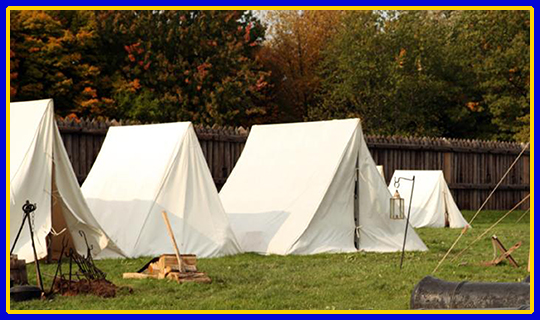
After that, the sound of rain in the night would wake me, where I roomed on the second floor of my college housing. I couldn’t go back to sleep until I remembered that a solid roof, not thin canvas, lay between me and the rain. I was dry. It took months before I once again slept through a night rain.
To Tease Your Mind
Good writing is supposed to evoke sensation in the reader
– not the fact that it is raining, but the feeling of being rained upon.
 E. L. Doctorow
E. L. Doctorow
(1931-2015)
American novelist, editor, and professor
(Boy! Did I ever “get” the feeling of being rained upon! – SMC)
What Else Is There?
June and July were very “August” this year, with heat, rain, and extreme humidity here in New England. I’m not really complaining: this is nothing compared to the American South and Southwest, where daily temperatures over 110°F have been baking the region for two months. No matter how dry the air is in Arizona (“arid” “zone”, after all), 120°F in the shade is still dangerous.

Other parts of the country have been seriously afflicted, too, with heavy smoke from wildfires burning in Canada, without cease since April or May. Evidently Canada isn’t receiving any of this rain. The smoke is likely seeding the clouds, creating rain in New England. During the American Civil War it wasn’t unusual, after a major battle during which tons of gunpowder were ignited by cannon and musket, for heavy rains to swamp the retreating armies the next day. (That’s my theory and I’m sticking with it!)
Humidity is a perennial element of life along New England’s Atlantic coast. It doesn’t surprise us. Sometimes it is too thick to breathe. It produces sweat without the least physical effort. Its cooler cousin is fog, which can blanket the Down East coast for weeks on end, rising and dropping, looking like a solid bank lying on the sea’s horizon one evening, only to return in the night to shroud everything outside the windows come dawn. It’s most prevalent in August.
Many Maine folk artists – singers, writers, story-tellers, painters – have described such visibility (or lack thereof) vividly. Gordon Bok, folksinger, includes this line in one of his stories: “as blind as the middle of a pillow.” I’ve experienced fog that thick, when you can’t see beyond your windshield wipers. Just pull over and wait for a bit of moving air to lift it.
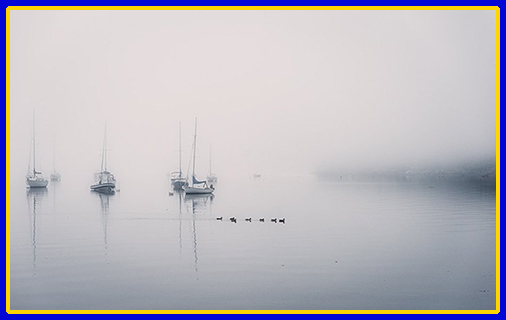
Marshall Dodge was a native New Yorker who became fascinated with Maine humor and studied deeply its social, cultural, and psychological origins and influences. (Maine humor comes in two flavors: understated and exaggerated.) In one routine recorded on one of his half-dozen “Bert & I” albums, the narrator (“I”) tells of a Maine coast fog (“humdiddy”) so thick and heavy that a local ferry cruised on the stuff all the way to Augusta (39 miles inland). When the fog burned off, the captain and crew found their vessel grounded on a hillside.
 Along with the rest of the wood in our house, the floor boards in our upstairs hallway swell this time of year, and crack loudly when walked on, as one board squeezes past its too-tight neighbors. For the amount of racket they make, you’d think we each weighed a ton.
Along with the rest of the wood in our house, the floor boards in our upstairs hallway swell this time of year, and crack loudly when walked on, as one board squeezes past its too-tight neighbors. For the amount of racket they make, you’d think we each weighed a ton.
This year, the sun didn’t show up for the Fourth of July. As usual, I was up to my ears in patriotic activities, which included marching in two parades. The first parade steps off at 8 am, so even if it becomes a hot, sunny day, the heat hasn’t yet built up at that hour. This year we had on-and-off rain, sometimes light, sometimes heavy – BUT it never rained during the activities. About 2 pm, the rain came down in buckets and it never let up until 4:45 pm, fifteen minutes before the last parade stepped off.
It’s guaranteed that performers will get wet on the Fourth of July – either it’s hot and we sweat thoroughly or it rains and drenches us. I prefer the former, though, because pouring rain discourages spectators from coming out to enjoy the festivities. We march anyway, but it’s more fun when there’s an audience. As damp and humid as the day was, the cloud cover was a blessing: If the sun had come out, we all would have been sauteed.
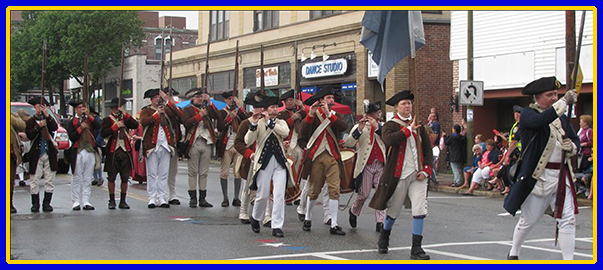 Speaking of fifing and drumming, a number of tunes from original manuscripts, dating to the 17th and 18th centuries, have a “wet” title. Three that my corps performs are called “Wet and Weary,” “Splash Petticoats,” and “Cold and Raw.” The tunes are far cheerier than the titles.
Speaking of fifing and drumming, a number of tunes from original manuscripts, dating to the 17th and 18th centuries, have a “wet” title. Three that my corps performs are called “Wet and Weary,” “Splash Petticoats,” and “Cold and Raw.” The tunes are far cheerier than the titles.
Speaking of sauteeing, when I was living in Virginia, I drove north to New Hampshire to attend the Saturday wedding of one of my nieces. I headed back south on Sunday, which was forecast to be the hottest day of the year. My little old 1984 VW Rabbit featured the invincible 255 AC system: Roll down the 2 windows and go 55 mph down the road. I engaged this AC when I left at 8 am.
By 9 am, it was obvious that resting my bare arm in the open window for the duration of the trip would not do. The sun would soon burn it crisp. (And I don’t burn readily.) My options: 1) cover my arm with a sleeve, 2) roll up the window and suffocate, or 3) buy BBQ sauce and slather it liberally on my arm.
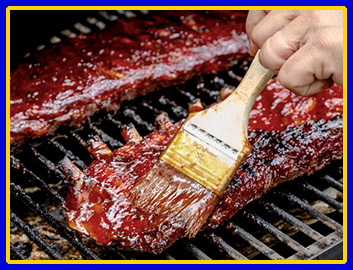 The only garment with sleeves I had was a plastic raincoat. Wrapped in that, my arm would melt to the bone. Option 1 had an alternative version: By the time I got to Connecticut, retail stores were open. I stopped at a mall and bought a thin, long-sleeve linen shirt on discount, and wore that the rest of the trip.
The only garment with sleeves I had was a plastic raincoat. Wrapped in that, my arm would melt to the bone. Option 1 had an alternative version: By the time I got to Connecticut, retail stores were open. I stopped at a mall and bought a thin, long-sleeve linen shirt on discount, and wore that the rest of the trip.
We’ve had warm and wet springs and summers before, but this year’s combination has produced exponential growth in all the plants around our house unlike any before. In the late fall, I always prune the mock orange bush and the forsythia, because heavy snows bow them bow over so much. I’ve never had to prune the mock orange again the following summer.
Not this year! The mock orange took over the south side of the front steps and the walkway to the back yard with a vengeance. The forsythia (obviously in cahoots with the mock orange) laid claim to the public sidewalk. The mock orange was so heavy with blossoms that it bowed over just like in the winter, blocking the light to the false spirea and other plants under it. Those are now behind their kinfolk in the neighborhood – they haven’t yet bloomed. And the front porch, steps, and railings are plastered with the remains of dead flower petals that don’t easily sweep away.
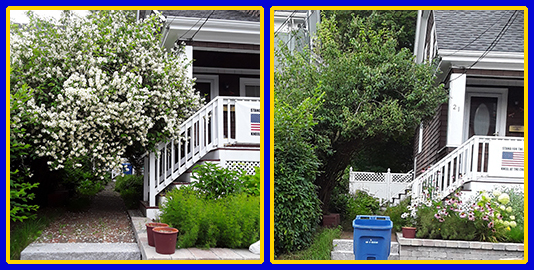 “before” and “after”
“before” and “after”
I finally got out last Saturday (the first dry one we’ve had in months) and spent four hours hacking back the mock orange and the forsythia. The pile was as tall as I am and fifteen feet long. It took almost as long to bundle the mess as it did to cut it. (Now to tackle the dead blossom detritus with soap and water and a scrub brush.)
In 2003, I wrote this little spoof, because of our similarly wet spring and summer that year. Wonder of wonder, it lives still in my files! (Never throw anything away, physically or electronically.) Here for your reading pleasure are:
The Precipitation Chronicles
Sneak Book Preview:
In The Wet
A new dictionary will be out on the stands next month, with 362 definitions for all the latest classifications of rain.
Liberally annotated with footnotes and sidebars, this dictionary also describes newly studied effects of these rains, such as humidity, degrees of rawness, the effects of cold Arctic blasts and of warm tropical winds upon rain, the effects of different kinds of rain on the spawning of a new subspecies of slugs, the Delaware tadpole plague, and the latest technology in measuring everything from nanoseconds of infinitesimal precipitation to weekend-long torrential downpours.
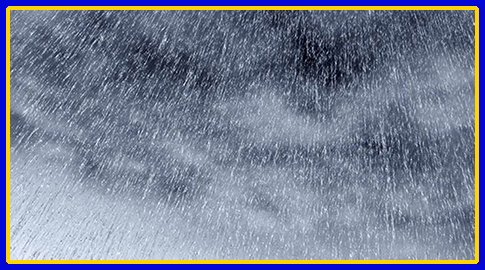 Look for it in fine bookstores everywhere under the title of In The Wet (plagiarized most deliberately from Nevil Shute, author of the 1953 novel In The Wet and most famous for his apocalyptic 1957 novel On The Beach). This In The Wet is written by renowned Chinese meteorologist Soh Kee Nwet, recipient of the 1998 Nobel Prize in Science for his treatise on lava-flow utilization as a source of household heating in the Gobi Desert.
Look for it in fine bookstores everywhere under the title of In The Wet (plagiarized most deliberately from Nevil Shute, author of the 1953 novel In The Wet and most famous for his apocalyptic 1957 novel On The Beach). This In The Wet is written by renowned Chinese meteorologist Soh Kee Nwet, recipient of the 1998 Nobel Prize in Science for his treatise on lava-flow utilization as a source of household heating in the Gobi Desert.
In related news, Massachusetts is currently in a stiff competition against the Pacific Northwest to host the 121st Annual Mildew Festival this year. New sites never before classified as wetlands abound in the state. Keep abreast of the latest updates on the gala event at www.precipitationchronicles.com.
Stay cool! Stay dry! This too shall pass!
A Book Worth Checking Out
 Charitable Writing: Cultivating Virtue Through Our Words (2020)
Charitable Writing: Cultivating Virtue Through Our Words (2020)
Richard Hughes Gibson and James Edward Beitler III
published by IVP Academic, an imprint of InterVarsity Press, Downers Grove, IL
Although this book is aimed at Christian writers, it has considerable worth to secular writers as well. The basic premise is that writers produce work of greater value and influence when they practice humility, when they listen, and when they share ideas with other writers in order to develop a theme thoroughly.
This last idea – the sharing – is fully developed in Chapter 11, called “Slow Writing.” Many of us who write, particularly when it is a requirement and the act is something we dread, seek the fastest way to capture the message and get on with life. How many of us, as students, submitted the first draft of our term papers as the finished product, having procrastinated until the night before to put pen to paper?
Techniques abound for preparing written content more quickly and efficiently. That’s not a problem, unless the goal is just to get it over with. The authors propose, rather, that we savor the project, nurture the theme, bounce ideas off others who may have experience, advice, or different perspectives that will make the finished product better.
Sources
Image: Benedict Arnold, painted in 1776 by Thomas Hart
https://en.wikipedia.org/wiki/Benedict_Arnold%27s_expedition_to_Quebec#/media/File:Benedict_Arnold_1color.jpg
Image: encampment tents
https://arts.ny.gov/node/131316
Image: E. L. Doctorow
https://bookmarks.reviews/e-l-doctorows-5-most-iconic-novels/
Image: blazing sun
https://news.mit.edu/2011/thermo-photovoltaics-1202
Image: fog in Cutler Harbor, Maine
https://www.onlyinyourstate.com/maine/20-eerie-shots-in-me/
Image: Marshall Dodge on the cover of one of his “Bert & I” albums
https://www.amazon.com/-/he/Marshall-Dodge/dp/1934031119
Image: Col. Bailey’s 2nd Mass Regiment, Wakefield Fourth of July parade
https://marksardella.net/2017/02/12/bring-brady-to-wakefield/
Image: brushing on BBQ sauce
https://www.smoker-cooking.com/smoking-ribs-when-do-you-apply-bbq-sauce.html
Image: heavy rain
https://steemit.com/science/@donfelix/forms-of-precipitation



